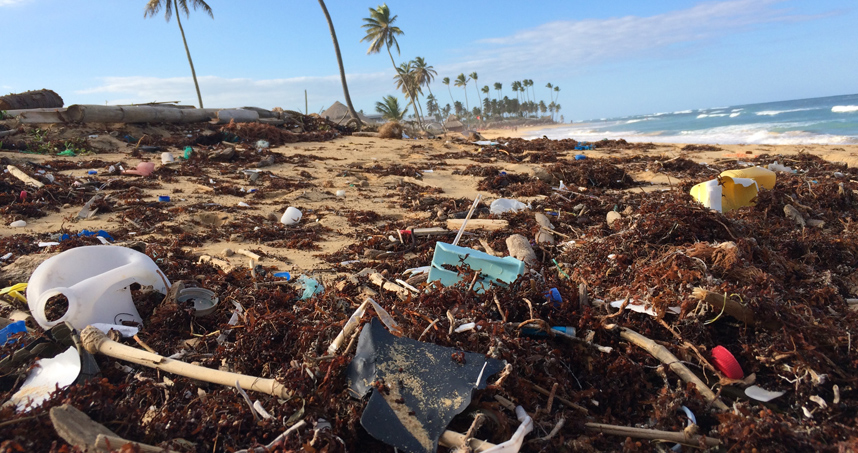Northwestern Launches Program on Plastics, Ecosystems, and Public Health
Network of researchers from academic, civic, government, and industrial institutions convene to focus on plastic waste impacts and solutions
The Institute for Sustainability and Energy at Northwestern University (ISEN) is spearheading a new Program on Plastics, Ecosystems, and Public Health. The Program’s ultimate goal is to establish comprehensive scientific understanding of the uncertain environmental and human health impacts resulting from the unprecedented use and accumulation of plastics worldwide, while accelerating the discovery of scalable solutions to mitigate such impacts.
Rooted in Northwestern’s renowned multidisciplinary team science culture, the Program is designed to link experts from across the University in fields of materials science, chemistry, engineering, law, and public health to the complementary research of the Program’s targeted network of members from academic, civic, government, and industrial partner institutions.
“Operating through an agile innovation network is essential to our goal of accelerating discoveries at global scale to protect our vulnerable ecosystems and address uncertain human health impacts,” said ISEN managing director Demetria Giannisis. “Robust interdisciplinary collaboration is at the heart of this Program. We will continuously build and re-build our network to incorporate new partners from academia, industry, NGOs, and funding sources as progress is made across the domain from basic research to breakthrough discoveries and solutions.”
Today, the world produces more plastic waste than ever, adding about 300 million additional tons per year — nearly equivalent to the weight of the entire human population. Most of that plastic — approximately 79 percent — ends up in landfills or the environment. The World Economic Forum recently found that if current trends continue, the oceans could contain more plastic than fish, ton for ton, by the year 2050, with the majority of this waste entering the seas via the world’s freshwater systems.
Because plastics were designed for uses that require resistance to degradation, most types of the material never fully break down when they enter the environment. Microplastics — fragments of plastic measuring 5 or millimeters or smaller — have been found in everything from air and tap water to table salt, beer, and seafood. For the first time ever, late last year researchers revealed that they had discovered microplastics in the human digestive tract.
 “The scientific community recognizes the problem of plastic pollution, but more research must be done to understand how it moves through the environment and the extent of its impacts, and to discover deployable, cost-competitive solutions,” said John Torkelson, Walter P. Murphy Professor of Chemical and Biological Engineering and Materials Science and Engineering at Northwestern Engineering. Torkelson is a Program network member who has been working on the recyclability of plastics for two decades.
“The scientific community recognizes the problem of plastic pollution, but more research must be done to understand how it moves through the environment and the extent of its impacts, and to discover deployable, cost-competitive solutions,” said John Torkelson, Walter P. Murphy Professor of Chemical and Biological Engineering and Materials Science and Engineering at Northwestern Engineering. Torkelson is a Program network member who has been working on the recyclability of plastics for two decades.
Priorities for the new Program on Plastics, Ecosystems, and Public Health include research on the product lifecycle of everyday plastics, exploration of the implications for environmental and human well-being, and the discovery of substitute materials and processes that are environmentally benign or restorative. The Program and its membership network are built around three intersecting research areas:
- Materials and Product Innovation
- Air, Land, and Water Ecosystem Dynamics
- Public Health Impacts
As a University-wide institute with a ten-year history of designing and supporting interdisciplinary teams and global partnerships, ISEN is aptly positioned to manage the new Program and its vast network of collaborators. ISEN has also been invited to join Ellen MacArthur Foundation’s CE100 initiative on behalf of Northwestern, placing the Program at the center of world’s largest collaborative circular economy coalition, alongside global leaders from business, government, academia, and NGOs.
The launch of the new Program at Northwestern coincides with growing public awareness surrounding the issue. On a national level, the European Union, United Kingdom, India, and Chile are pursuing single-use plastic bans. Ambitious new partnerships such as the Alliance to End Plastic Waste, New Plastics Economy Global Commitment, and Circulate Capital have brought together some of the world’s largest private-sector and NGO players, pledging billions of dollars to combat plastic waste.
To-date, ISEN has convened network members of the Program on Plastics, Ecosystems, and Public Health for a series of workshops focused on the development of joint research initiatives and capacity-building. On May 13, ISEN will hold a workshop focused on the public health implications of plastics and plastic additives. In late 2019, ISEN will host a forum event that will engage with an expanded coalition of industry and foundation partners.
